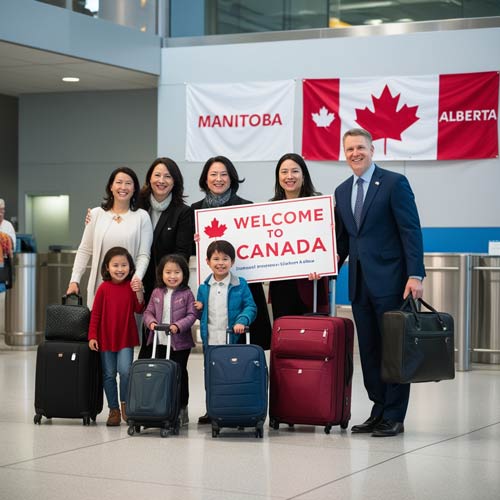Table of Contents
Canada Dramatically Reduces Immigration Backlog: Key Updates and Insights
Canada’s Immigration, Refugees, and Citizenship Canada (IRCC) has announced a major reduction of 64,200 in its immigration application backlog between November and December 2024. As of January 2025, this progress reflects the government’s commitment to addressing delays in processing applications for temporary and permanent residency, as well as citizenship, offering hope for faster approval times.
The IRCC’s total application inventory stood at over 2.18 million by year-end 2024, with approximately 713,000 backlogged cases—down from 777,200 in November. Key application categories affected include permanent residency (PR), temporary residency, and citizenship, with PR backlog cases dropping to 188,019 and citizenship backlogs reduced to 132,000.
Key strategies driving these improvements include increased workforce recruitment, prioritization of certain application streams like family reunification, technological advancements, and greater transparency in processing timelines. The enhancements are expected to benefit international students, workers, and families, ensuring faster approvals while easing economic and social challenges for applicants.
While the improvements are promising, applicants are encouraged to submit complete, error-free applications to avoid further delays. Legal professionals like Sohi Law Group are available to assist with navigating Canada’s complex and evolving immigration processes.
This milestone reflects Canada’s evolving immigration system, underscoring both opportunities and the importance of readiness for prospective newcomers in 2025 and beyond.
Canada Immigration Backlog Reduced by Over 64,000 Applications: What You Need to Know
Canada’s Immigration, Refugees, and Citizenship Canada (IRCC) recently announced a dramatic reduction in its immigration application backlog, signaling a significant improvement in processing efficiency. Between November and December 2024, the IRCC slashed its backlog by 64,200 applications, reflecting the government’s ongoing commitment to addressing processing delays. As of January 27, 2025, the most recent data highlights substantial progress that will directly impact immigrants and applicants waiting for their cases to be reviewed.
For applicants and their families, this is encouraging news as it suggests shorter wait times and a more streamlined process in the months ahead. Below, we delve deeper into what this update means, what factors have contributed to the improvement, and what applicants should expect moving forward.
IRCC Backlog Numbers: A Closer Look
The IRCC backlog refers to applications that exceed the standard service timeframes set by Canada’s immigration authorities. This backlog has been a contentious issue in recent years, with many applicants facing prolonged delays in obtaining study permits, work permits, family reunification visas, and permanent residency status.
The recent data shows progress on multiple fronts. As of December 31, 2024, IRCC’s total inventory stood at approximately 2,186,300 applications, encompassing temporary residence, permanent residence, and citizenship applications. While overall inventory includes applications within normal processing timelines, the backlog consists specifically of those outstanding applications that exceed regular processing standards.
Out of this total inventory, about 713,000 applications were categorized as backlogged, down from 777,200 as of November 30, 2024. This reduction of 64,200 applications represents not only a significant improvement but also highlights the government’s dedication to addressing immigration bottlenecks.

Breakdown of Application Categories
1. Permanent Residency Applications:
For permanent residency (PR) applicants, the IRCC reported an inventory of 521,552 cases at year-end, of which 188,019 applications were in the backlog. This includes individuals awaiting decisions on Express Entry programs, family class sponsorships, provincial nominee programs, and more.
2. Temporary Residency Applications:
Temporary residence applications made up the largest portion of the inventory, with a total of 1,216,000 applications. Approximately 393,000 of these were in the backlog category. Temporary residency includes work permits, study permits, and visitor visa applications submitted for both initial entry and extensions.
3. Citizenship Applications:
Citizenship applications totaled 448,000, with only 132,000 being backlogged cases—a noteworthy improvement compared to earlier last year. This trend indicates progress in IRCC’s efforts to meet growing demand from residents seeking to officially acquire Canadian citizenship.
IRCC’s Strategies to Alleviate Processing Delays
The reduction in backlog appears to be the result of systemic improvements implemented by the IRCC over the past few months. Key contributing factors include:
– Technological Investments: IRCC’s focus on digitizing application processes has played a substantial role in improving efficiency. The introduction of new online processing tools and AI-assisted workflows has allowed the department to process high volumes of applications with greater speed and accuracy.
– Recruitment of Additional Staff: To manage increased application volumes, IRCC expanded its workforce, bringing in additional officers to reduce processing times and improve client service.
– Targeted Prioritization: In response to pressing needs, the IRCC prioritized certain categories of applications, such as family reunification and economic immigration streams that directly contribute to Canada’s economic growth.
– Improved Transparency: Applicants now benefit from an enhanced level of communication and transparency about processing timelines through real-time updates available on IRCC’s web platform.
Implications for Applicants in 2025
The IRCC’s reduction in backlog comes as a welcome relief for individuals and families navigating immigration pathways in Canada. By cutting down wait times and expediting decisions, applicants may find themselves better positioned to achieve their goals, whether in education, career, business, or family reunification.
For instance:
– International Students and Workers:
Those seeking study permits or work opportunities in Canada may benefit from shorter approval times, potentially allowing them to align with academic or work start dates more effectively.
– Permanent Residency Aspirants:
Applicants applying under the Express Entry or provincial nominee programs may experience fewer delays when striving to settle permanently in Canada.
– Family Reunification:
Families separated by borders can expect quicker processing of sponsorship applications, putting them on a faster track to reunification.
Despite these improvements, applicants are advised to ensure their submissions are complete, accurate, and error-free to avoid further delays. Legal expertise may help mitigate issues that arise during the immigration process and can improve the likelihood of favorable outcomes.

How Sohi Law Group Can Support You
Navigating the immigration process can often feel overwhelming—especially for those concerned about the implications of past delays. At Sohi Law Group, our experienced immigration lawyers are committed to providing strategic advice and comprehensive support to individuals, families, and businesses.
Whether you need assistance with:
– Preparing a temporary residence visa or permanent residency application
– Addressing previously delayed cases or overcoming adverse decisions
– Sponsoring a loved one through family reunification procedures
– Navigating other immigration pathways such as Express Entry or provincial nominee programs
Our team is here to provide personalized, practical solutions tailored to your unique circumstances.
The reduction in the IRCC backlog is a step in the right direction, but it is important to recognize that immigration applications often involve complex legal requirements and ever-changing government policies. Our goal is to make the process as seamless as possible while minimizing challenges along the way.
If you’re ready to take the next step, reach out to Sohi Law Group today for a consultation. Let us guide you through Canada’s immigration system with professionalism, diligence, and care.
Final Thoughts
The IRCC’s recent backlog reduction is a milestone that underscores Canada’s commitment to enhancing its immigration system. For applicants, this progress not only offers hope but also serves as a reminder to act quickly and efficiently when pursuing immigration opportunities.
As Canada continues to welcome newcomers who contribute to its economy and communities, the role of legal professionals remains indispensable. At Sohi Law Group, we stand ready to help you navigate this evolving landscape and achieve your immigration goals in 2025 and beyond.




No comment